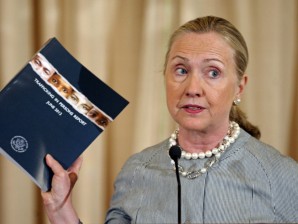
Secretary of State Hilary Rodham Clinton holds up a copy of the 2012 Trafficking in Persons Report during a ceremony marking the occasion at the State Department in Washington, Tuesday, June 19, 2012. AP/Cliff Owen
WASHINGTON – Up to 27 million people are living in slavery around the world, US Secretary of State Hillary Clinton estimated Tuesday as the US unveiled its annual report into human trafficking.
“The end of legal slavery in the United States and in other countries around the world has not, unfortunately, meant the end of slavery,” said Clinton.
“Today it is estimated as many as 27 million people around the world are victims of modern slavery, what we sometimes call trafficking in persons,” she said at the unveiling of the report at the State Department.
“Those victims of modern slavery are women and men, girls and boys and their stories remind us of the kind of inhumane treatment we are capable of as human beings,” said Clinton.
“Whatever their background, they are the living, breathing reminders that the work to eradicate slavery remains unfinished.”
As America prepares to mark the 150th anniversary of the proclamation of the emancipation of US slaves, people must reflect on “how much further we have to go to free all these 27 million victims,” Clinton added.
The State Department’s annual report said however that progress was being made on cracking down “on the scourge of trafficking in persons” with more governments bringing prosecutions while setting up systems to help victims.
Out of the 185 countries included in the 2012 report, only 33 complied fully with laws in place to end human trafficking, such as the Universal Declaration on Human Rights which prohibits slavery and involuntary servitude.
But five countries had moved up from the bottom ranking Tier 3, including Myanmar and Venezuela, to be included among the 42 countries now on a US watchlist.
Among the 17 countries on the bottom of the table were Algeria, the Democratic Republic of the Congo, Libya, North Korea, Saudi Arabia, and Syria.
“Traffickers prey on the hopes and dreams of those seeking a better life,” said Clinton. “Our goal should be to put these hopes and dreams back within reach.”
But she hailed the fact that in the 2012 Trafficking in Persons report a total of 29 countries had been upgraded from a lower ranking, “which means that their governments are taking the right steps.”
Clinton pointed to such things as “enacting strong laws, stepping up their investigations and prosecutions, or simply laying out a road map of steps they will take to respond.”
Ambassador Luis CdeBaca, from the office to monitor and combat trafficking in persons, told reporters: “There is a little bit of movement, which means the countries are passing laws and are starting to address the situation.”
While the number of people officially identified as victims of trafficking and slavery had gone up by 28 percent since last year to 42,291, the numbers of prosecutions in 2012 had also increased by 10 percent to 3,969, he said.
The focus of this year’s report is on how to better protect the victims, and it urges government to meet the challenge head-on.
“Traffickers are criminals. Governments – which alone have the power to punish criminals and provide legal recourse to survivors – cannot waver in their efforts to confront modern slavery,” the report says.
But it also argues that human trafficking takes many guises and it is not just about moving people across borders to trap them in prostitution.
“The United States government, and increasingly, the international community, view ‘trafficking in persons’ as the term through which all forms of modern slavery are criminalized,” it says.
A modern-day slave can be a migrant worker lured abroad by the promise of a well-paying job as a nanny or a factory worker, whose freedom of movement is then curtailed perhaps by having their passport taken away.
It can be someone who stays in their own country but is kept in forced labor, and denied the right to leave.
“The essence of the trafficking experience is the denial of freedom, including the freedom to choose where and how you live, the freedom to work or choose not to work, the freedom from threats, and the freedom of bodily integrity,” says the report.